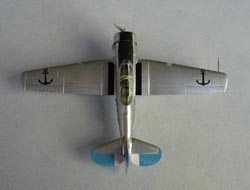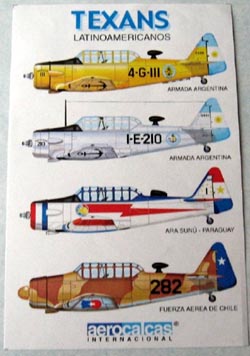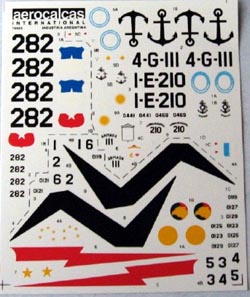With the recent re-release of Airfix’s Texan, Revell of Germany’s
new kit and the ready availability of Academy, Heller and Testors kits,
it seemed like a good time to find some unique decals for this venerable
workhorse. It has been said more American pilots were trained on a version
of the Texan than any other plane. The Texan was extensively exported
to so many foreign nations it is hard to count all of them. The ageless
Texan is now the star of many warbirds shows, often taking newcomers up
for a taste of what flight can be.


|
I was able to find an interesting sheet in 1/72 scale by Aerocalcas
Internacional using the internet. This company is in Argentina, so
not surprisingly, there are more than a few Argentinean airplanes on each
sheet. The decals were all in register. They are very thin and easily
separate from the backing paper. Some of the decals are so small that
it is difficult to align them properly. This is probably more a function
of my failing eyesight than the design of the decals. I noticed no silvering
when they were applied to an Academy Texan I built to try an experiment
using Chrome Silver from a spray can. The experimenting continues, but
the finished model gives a good indication of how the decals can look
on a completed kit.
In addition to the decals, there are instruction sheets covering all
of the airplanes, showing location of the decals and also indicating color
schemes for each plane. The colors are given in a mixture of Humbrol,
FS and generic names. The instructions arein English and Spanish.
This sheet contains markings for five different Texans, two from Argentina,
one from Uruguay and two from Spain. There are enough decals to build
four of the five options. You have to choose between the Argentine airplanes,
since only one set of the fuselage insignia is supplied.
The first plane on the sheet is the one I chose to try out the decals.
It is from the Armada Argentina. It is an all silver airplane that was
used during the 1960s and 1970s as a trainer. The blue/white/blue national
colors on the rudder and tailplane break up the monotony of the all silver
color.
The next airplane on the sheet has a scheme in light gray with the
undersides in matt white. It has a nice red cowling and the same blue/white/blue
rudder and tailplane as the first airplane. The fuselage emblem on both
this airplane and the preceding one looks great, but is composed of four
different decals, two of which are very tiny. An optivisor, magnifying
glass or young eyes are needed to properly apply this emblem.
The third plane on the sheet was used by the Air Force of Uruguay.
It is camouflaged in brown and green with a light blue undersurface and
a red spinner.
The fourth and fifth airplanes are from the Spanish Air Force and used
in the Spanish Sahara between 1958-1975. One is in natural aluminum with
a white rudder and black X. The other is in a camouflage scheme of brown,
green and sand with a light blue undersurface.
I purchased the decals from FLIGHTDECS.
Aerocalcas also has a web page
at www.aerocalcas.com I have no connection with either company.
|
|



